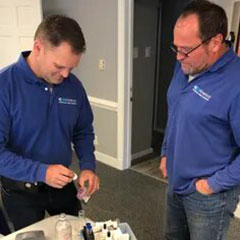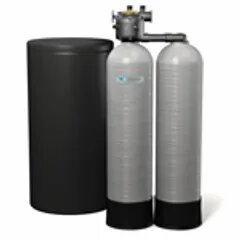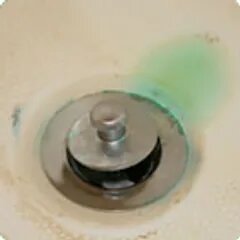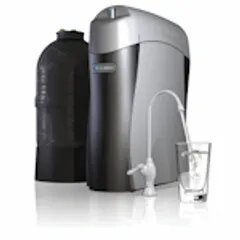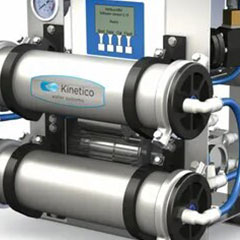Owning a Kinetico System
Were can I purchase materials and filters?
If you live in the Central Virginia area, you will need to contact us at 877-60-WATER or Kinetico.com If you do not live in the Central Virginia area, please go to Kineticorichmond.com
I own a Kinetico system currently and it needs service, who can I call?
If you live in the Central Virginia area, you will need to contact us at 877-60-WATER or Kineticorichmond.com If you do not live in the Central Virginia area, please go to Kinetico.com to find your local dealer.
I own a Kinetico system now, can I get a copy of the owner's manual or more information from your website?
If you live in the Central Virginia area, you will need to contact us at 877-60-WATER. (or Kineticorichmond.com) If you do not live in the Central Virginia area, please go to Kinetico.com.
Water Health
Isn’t bottled water better for you than tap water?
Although bottled water is typically of high quality, the Federal regulations for bottled water are not more stringent than those for tap water. This means that federal laws only mandate testing for a select few out of the many known chemical contaminants. However, other factors such as cost, convenience, and practicality also play a significant role. Investing in your own Kinetico K5 Drinking Water Station becomes significantly more cost-effective when you factor in the time and expenses associated with purchasing bottled water. Moreover, the Kinetico K5 system provides the flexibility to use water for a variety of needs, including cooking, without the need to ration. By treating your water at home, you eliminate the necessity to store bulky plastic bottles and gain access to an endless supply of water directly from your tap, at a cost per liter much lower than that of bottled water.
Additionally, the environmental impact of bottled water raises concerns due to the unnecessary production of plastic, the transportation of products, and the waste or recycling of empty bottles.
Don’t water filters remove important minerals from my water?
Research indicates that the minerals found in drinking water essentially do not benefit your health and may even be in forms that your body cannot utilize. You are far better off obtaining your minerals through your diet.
How much water should I drink in a day?
The average person requires between a quart and a half gallon of water daily. However, it's important to recognize that water needs are highly personal.
Though the rule of a quart to a half gallon daily applies to generally healthy individuals, this quantity varies depending on the intake of water from other drinks and foods. Additionally, factors such as specific health conditions, medications, levels of physical activity, and the surrounding temperature can affect the overall daily water requirement.
Regrettably, a significant number of people, particularly the elderly, do not consume enough water.
What are the effects of the chlorine in our drinking water?
The public's concern about chlorine's impact on water's taste and odor has unveiled deeper worries, igniting a fervent debate. This debate primarily focuses on the safety of chlorine, particularly its potential role as a carcinogen.
Chlorine's interaction with organic materials leads to the formation of byproducts that can harm the heart, kidneys, nervous system, and lungs. These byproducts have also been linked to an increased risk of certain cancers. The health effects of trihalomethanes (THMs), a group of these byproducts, have been extensively discussed in numerous articles, making it a topic worthy of further exploration. The revelation of such data led the Environmental Protection Agency (EPA) in the United States to set limits on the allowable levels of chlorine byproducts in drinking water. The elimination of chlorine byproducts is a critical goal for any personal water treatment strategy.
How I can protect myself and my family from lead in drinking water?
Millions of homes still contain lead-based paint, often hidden beneath layers of newer paint. When the paint remains intact, lead-based paint typically doesn't pose a risk. However, lead-based paint that is deteriorating—showing signs of peeling, chipping, chalking, cracking, damage, or moisture—becomes a hazard and requires prompt action.
Lead-based paint becomes particularly dangerous on surfaces that children might chew on or that undergo frequent wear-and-tear, such as windows and sills, doors and door frames, as well as stairs, railings, banisters, and porches.
To minimize lead exposure risks in older homes and buildings, follow these guidelines: Regularly inspect and maintain all painted surfaces in pristine condition, and frequently clean dust with a wet cloth or paper towel. Educate yourself on straightforward measures to safeguard your family from lead dangers. Seek advice from a certified lead expert before initiating any renovation, repair, or painting projects, as these activities can generate harmful lead dust by disturbing or demolishing painted areas.
Prevent lead dust from being brought into your home by cleaning and removing shoes before entry and placing mats both inside and outside entry points.
Determine whether your home is serviced by a lead pipe. Contact your water utility or a licensed plumber to check if your home's connection to the water main is made of lead. For more information, visit EPA's lead safety page.
Don’t water filters remove fluoride from my water?
In recent times, the addition of fluoride to drinking water has sparked significant debate among scientists and health officials regarding its safety and efficacy. The core of the discussion revolves around its effectiveness and the ability to regulate or manage its levels appropriately. Excessive fluoride can be more harmful than none at all. Once fluoride is introduced into the water supply, it becomes difficult to eliminate. While many standard jug and faucet filters can successfully remove major contaminants from water, they often fail to filter out fluoride.
Water In your Life
Many filtration systems assert their ability to remove fluoride from your water, yet consumers should proceed with caution. It's important to ensure that the filtration system you choose is certified by the Water Quality Association or NSF International as effective in eliminating fluoride additives. For the most efficient and effective fluoride removal, the use of a reverse osmosis filtration system is recommended.
How much water should I drink in a day?
How much water should one drink daily? The general recommendation is about four to six cups of plain water. However, individual needs may vary.
The guideline of four to six cups a day applies to generally healthy individuals, but actual needs can vary depending on intake from other beverages and foods. Factors like health conditions, medications, physical activity levels, and the surrounding temperature also play a role in determining daily water requirements. Water is essential for the optimal functioning of every bodily system. According to the Harvard Medical School Special Health Report 6-Week Plan for Healthy Eating, water performs several critical functions, including:
- Transporting nutrients and oxygen to cells
- Clearing bacteria from the bladder
- Supporting digestion
- Preventing constipation
- Stabilizing blood pressure
- Cushioning joints
- Protecting organs and tissues
- Regulating body temperature
- Managing electrolyte (sodium) balance
What are the effects of the chlorine in our drinking water?
Since 1908, starting in New Jersey, the US has been treating its water supplies with chlorine, a practice that has significantly reduced water-borne diseases like cholera and typhoid fever.
However, concerns about chlorine's impact on water's taste and smell have led to intense discussions. The debate primarily focuses on the safety of chlorine, especially regarding its potential carcinogenic effects.
The breakdown of organic materials by chlorine results in byproducts that can harm the heart, kidneys, nervous system, and lungs, and increase the risk of certain cancers. Trihalomethanes (THMs) and their health effects have been the subject of numerous studies, making this an important area for research. These findings have led the Environmental Protection Agency (EPA) in the United States to set limits on the levels of chlorine byproducts allowed in drinking water. Targeting the elimination of chlorine byproducts is a crucial goal for any water treatment strategy at home.
What exactly is soft water?
If you're dealing with hard water, you might observe stains or scale accumulation on your sinks, bathtubs, showers, and clothes; scale deposits on your glassware; and scale-induced damage to your pipes and appliances. You'll also experience reduced lather from shampoos/soaps and a sensation of filmy dryness on your skin. Hard water is often linked to various skin irritations. These signs indicate the need for water softening. Hard water can lead to the formation of a rock-like scale in pipes, water heaters, plumbing fixtures, dishwashers, and other appliances that use water. This scaling can diminish water flow, block valves and vents, and cause maintenance issues, ultimately shortening the lifespan of your appliances.
I live in the city. Isn’t my water already treated by the municipality?
Your municipal water provider is not obligated to supply soft water. While many cities do treat their water to reduce hardness to a certain extent, the U.S. Geological Survey reports that 85 percent of cities still distribute hard water. However, your city must furnish you with water test results, including hardness levels; you can obtain these by contacting the number on your water bill.
Many individuals who receive municipal water opt to soften it themselves. The reasons for this include saving money on soaps and cleaning products, preventing scale buildup in plumbing systems, safeguarding water-using appliances from hard water damage, ensuring better quality water for bathing, promoting healthier skin and hair, and preventing hard water spots, among other benefits.
How do I know if my water is hard?
Contact us, and we can conduct a water analysis to check for hardness, iron, pH, and total dissolved solids, usually free of charge. Depending on the equipment available, additional tests might be possible. We can also refer your water sample to a specialized water testing facility for a comprehensive analysis. Your local Kinetico water professional will assist you in understanding the results and deciding whether any treatment is needed.
What are the benefits of treated water?
Using soft water can significantly reduce the amount of soap and detergent needed for cleaning. With soft water, cleaning agents don't have to counteract hard minerals, leading to easier lathering and more effective cleaning. A significant portion of the ingredients in many soaps and detergents are chemical "water softeners" designed to prevent the interaction between the detergent and hard water minerals that creates sticky residues or soap scum. Therefore, with soft water, these chemicals become unnecessary, and you can use less soap. Households with soft water can save substantially on laundry detergent, dish soap, hand soap, and various other cleaning products.
Soft water, devoid of scale-forming minerals, prevents the buildup of mineral deposits inside plumbing and water-using appliances, enhancing their efficiency and extending their lifespan. Major appliance manufacturers, such as Maytag, acknowledge the issues hard water causes and recommend using home water softeners for optimal appliance performance.
Moreover, the minerals that harden water, primarily calcium and magnesium, can negatively impact the taste and quality of your food and drinks.
Firstly, these hardness minerals can alter the taste of water and, by extension, any food or beverage prepared with it, like coffee, concentrated juices, soups, or even gelatin. Other contaminants in water can also impart undesirable flavors or harmful substances to food.
Secondly, hard water can affect the cooking and taste of certain foods, particularly fresh vegetables. The calcium in hard water reacts with proteins in vegetable skins, making them tough and sometimes causing them to shrivel, detracting from their flavor and texture.
What if I move?
Our warranties are transferable to the new homeowners if you leave the system at the original install location or take your system with you to your new home. Contact our office for details at 877-60-WATER.
Water Economics
How expensive are water treatment systems?
Investing in a whole home water treatment system offers numerous financial benefits. Treated water enhances the efficiency of your water heater, leading to lower energy expenses.
Soft, treated water is gentler on your pipes, plumbing fixtures, and appliances that use water, which means less wear and tear and, consequently, reduced repair and maintenance costs.
Moreover, using treated water means you'll need less detergent for laundry and dishwashing. It also reduces the consumption of shampoo and conditioners.
Furthermore, having a drinking water system in your home is far more cost-effective than buying bottled water.
Is filtered water less expensive than bottled?
What about the bottled water that has become a staple for so many? Firstly, it's costly—sometimes exceeding $1.00 per liter, making it 800 to 4,800 times more expensive than tap water. Secondly, it's inconvenient to carry around, and you need to make trips to the store to buy it. Thirdly, the plastic bottles require recycling to avoid filling up landfills. Lastly, the origin of bottled water might not be as pristine as imagined; it could simply be filtered tap water. Despite the images of distant Alpine valleys and untouched streams, the sources for bottled water are frequently close to urban areas.
I have heard that treated water can actually improve the performance of my water-related appliances. Is this true?
Did you know that your hot water heater ranks as the second biggest energy consumer in your household? Indeed, only your heating and cooling system surpasses it. Scale buildup from hard water can form a layer inside your water heater, significantly diminishing its efficiency. This leads to increased fuel use and higher utility bills, as the appliance must work harder to heat water through this mineral layer. A study by the Water Quality Research Council, conducted at New Mexico State University, found that water heaters are 22-30% less efficient when operating with hard water, leading to unnecessary spikes in utility costs. By using soft water, you not only extend the life of your hot water heater but also enjoy savings on your energy expenses.
How much electricity does it take to operate a Kinetico whole home water treatment system?
Kinetico's whole home water treatment system operates without electricity. It requires no plugging in, no button pressing, no timers to manage, and no adjustments needed. This means it won't add to your electric bill, and it's unaffected by power outages or surges. Moreover, you won't have to worry about costly repairs or replacements of electrical parts.

